Nearly 400 journalists surged toward U.S. Olympic Committee Chairman Larry Probst and Chicago 2016 Chairman Pat Ryan in the lobby of the Copenhagen, Denmark, convention center. It was October 2009, and the duo were minutes removed from seeing the International Olympic Committee reject Chicago’s bid to host the 2016 Olympics.
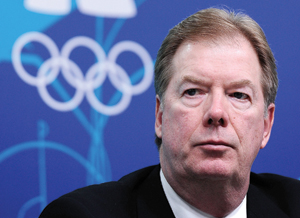 |
GETTY IMAGES
USOC Chairman Larry Probst has had a roller-coaster ride in nearly 3 years of backing U.S. Olympic efforts.
|
“Get back,” Ryan said as a crush of microphones, digital recorders and notepads pushed toward his face.
The swarm stopped pushing and began firing questions: Should you have bid? What went wrong? Would you do this again? What do you want to say to the people of Chicago?
Probst didn’t see a press corps. He saw a pack of barking, angry dogs. And he knew why.
President Barack Obama — the Nobel Prize winner, Mr. Hope and Change — had flown to Copenhagen to speak to the IOC and deliver the Olympics for his home city. Everyone within the USOC and Chicago 2016 believed his trip guaranteed victory. But Chicago lost. And it didn’t just lose. It got embarrassed. Only 18 of 94 IOC members voted for it.
Probst knew there would be hell to pay, and answering questions from reporters was just the beginning. When the Chicago bid’s communications chief, Patrick Sandusky, stepped in to cut off the press inquisition, Probst spoke up.
“No,” he said. “We can take more questions.”
It was a humbling moment for Probst. He had built the world’s most prestigious gaming company, Electronic Arts, and seen its revenue grow from $175 million in 1992 to $3 billion in 2006. His legacy as a successful businessman was secure, and he had become chairman of the USOC a year earlier to serve his country and make a difference.
But the changes he had made to the organization had been scrutinized and criticized, and the blunt, harsh questions that journalists repeated in Copenhagen told him one thing: Chicago’s loss was about to be tied around his feet, and the feet of the USOC, like a cinder block, and the reputation he’d built over a lifetime was about to go down with it. He could either fold the tent and say, “I don’t need this,” or he could double down and soldier on.
■ ■ ■
March 2008. Larry Probst stood on the lush grass of a driving range in Cabo San Lucas, Mexico, watching ball after ball sail into the sky. As he prepared to hit another shot, his cell phone rang.
“Larry, it’s Pete. I’ve got an idea. I want to get you involved in the Olympics.”
Probst had known Peter Ueberroth for more than 10 years. They spent time together every summer at the Allen & Co. conference in Sun Valley, Idaho, where Probst owned a home.
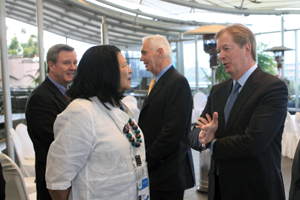 |
STRATOS SAFIOLEAS
Probst, seen above with IOC member Anita DeFrantz, has spent more time traveling abroad to meet with Olympic officials and improve the USOC’s reputation overseas. |
Probst had always admired Ueberroth. He believed the man who had saved the 1984 Los Angeles Olympics was an American hero. Ueberroth’s idea piqued his interest.
“Why don’t we talk about that when I get back home?” Probst said.
Ueberroth’s initial proposal was that Probst join the USOC’s board, but when the two got together at the Allen & Co. conference that July, Ueberroth had a different idea.
“You know, I think you ought to be chair,” Ueberroth said.
“Peter. Come on. I don’t have any experience,” Probst said.
But Ueberroth, whose chairmanship was set to end after the 2008 Beijing Games, insisted. He told Probst that it would be a chance to give back to his country and repay his good fortune in business. Plus, it would take only 10 percent of his time.
Probst liked the idea of working in sports. He was a huge sports fan who didn’t just follow sports but knew the history and could talk about everything from the 1977 Philadelphia Phillies lineup to 1980s NCAA tournament basketball games. He attended the Beijing Games that summer, and after being wowed by the opening ceremony, the crowds and the competition, he warmed to Ueberroth’s offer.
The USOC board of directors appointed him chairman on Oct. 2, 2008. At the time, he knew next to nothing about the Olympics or its acronyms. He couldn’t tell an NGB from the AAC or PASO from ANOC. He knew so little that he didn’t lead his first board meeting, which took place a week after his appointment. Instead, he deferred to Ueberroth, who remained on the board as an honorary president.
One of the topics that came up during the board meeting was CEO performance. Probst thought the organization was on solid footing with CEO Jim Scherr, a six-year veteran, but a contingent of the board was unhappy.
Probst sat down with Scherr after the meeting and outlined a performance plan with a series of targets the CEO would need to hit in order to keep his job. When Scherr failed to meet the goals, the board pushed him to step down, and appointed one of its own, Stephanie Streeter, to replace him.
National governing body CEOs, who had spent the previous years adopting USOC-mandated governance practices, criticized the change. USA Gymnastics President Steve Penny, who met with Probst days afterward, said, “It was wrong. Just plain wrong.” After all, if the USOC board ousted its CEO and replaced him with one of its own, could their boards not do the same?
Probst dealt with the NGB backlash at the same time that his wife, who he met in the seventh grade, was diagnosed with uterine cancer. (She had surgery and her cancer is now in remission.)
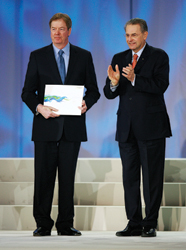 |
GETTY IMAGES
Probst flew to Berlin to meet with IOC President Jacques Rogge (right) after the organization criticized the USOC for its plans to start an Olympic television network. |
The challenges at home meant Probst was unwilling to invest in the USOC any more than the 10 percent of his time that he had been told the job would require. As he tried to limit his involvement, he opted to watch from the sideline as the organization moved forward with plans to launch an Olympic network. Ueberroth and then-USOC Chief Operating Officer Norman Bellingham announced a deal to launch a network with Comcast at the Allen & Co. conference in July 2009.
The announcement generated immediate criticism from the IOC. Within hours, IOC executive committee member Richard Carrión told The New York Times that the USOC’s leadership was “arrogant.”
Probst, who had met IOC President Jacques Rogge only once, was stunned by the IOC reaction and was unsure of what to do. He asked Pat Ryan and USOC international experts for advice. Ryan suggested that Probst attend the world championships of track and field in Berlin and speak to Rogge in person.
Probst did as Ryan and others advised. He traveled to Berlin, met with Rogge and other influential IOC members and told them all the same thing: The USOC was putting its network plans on hold.
He hoped the trip would save Chicago some IOC votes for the 2016 Olympics. But when the IOC convened in Copenhagen two months later, only 18 of 94 members voted for the city. The USOC’s failure to renegotiate its revenue-sharing agreement with the IOC, its controversial network announcement and its decision to change its CEO less than a year before the vote were all blamed for Chicago’s loss.
Some of the criticism that followed was directed squarely at Probst. Dick Ebersol, then-chairman of NBC Universal Sports and Olympics, said the USOC needed “real leaders.” He went on MSNBC’s “Morning Joe” days after the vote and said that the organization’s leaders were “not wired into the rest of the world.” Executives at 46 NGBs drove that point home by calling for Streeter’s and Probst’s resignations.
Streeter resigned, and friends and family urged Probst to quit, as well. They believed he was being criticized unfairly for a lot of things that he had little to do with.
“His reputation he’d worked his entire life to build was being diminished in this business very quickly, not just domestically, but, let’s face it, internationally,” said Mike Plant, a member of the USOC board and the Atlanta Braves’ executive vice president. “He did some soul searching.”
■ ■ ■
October 2009. Probst stood in the lobby of EA’s headquarters in California and greeted a half dozen of the nation’s top sports leaders. He had invited each of them to meet with him about the USOC. After they had taken a seat in a large meeting room off the company’s lobby, he told them that he planned to see his four-year term as the USOC’s chairman to its conclusion. He wouldn’t leave the job until he had stabilized the organization. But to do that, he needed their support.
The NGB leaders were each given a chance to speak. They questioned his understanding of their organizations’ volunteer base. They asked about the USOC’s commitment to good governance. They voiced frustration about the lack of transparency. They bitched and they griped and they blamed.
“Larry and I tried to be good listeners and not take the things said too personally, but there were things said that could be taken personally,” said Bob Bowlsby, a USOC board member and Stanford University’s athletic director. “It was obvious they had deep concerns.”
After quietly listening to the complaints, Probst leaned forward in his seat and gripped the table. He glared across the room.
“I know one thing,” he said. “We have to get this CEO hire right.”
Probst made the statement with such force and such authority that it brought conversation to a halt. People in the room said Probst sounded like a different person.
“It was a CEO moment,” said Max Cobb, US Biathlon’s executive director. “It was, ‘I’m in charge of this, and I’m telling you what I’m thinking about.’ He was in full leader mode. For me and the other folks in the room, his passion for getting this done and getting it done right became palpable.”
Probst closed the meeting by making it clear that he wanted the USOC to become once again the most respected national Olympic committee in the world.
The first thing he did was contact Paul Tagliabue. He asked the former NFL commissioner to chair a special commission to review the USOC’s structure and governance.
“When he first called me, I was wondering, ‘Why me?’” Tagliabue said. “But I quickly realized he was being treated unfairly and the perception was he had been a failure. I thought it was important for him to stay in the role. Turnover was the last thing they needed.”
Tapping Tagliabue for the job was no accident. Probst, who had been friends with Tagliabue for 20 years, knew Tagliabue’s credibility and integrity in the sports world was unassailable. He also knew Tagliabue had some key relationships in Washington, D.C., that could be helpful if, as Probst had heard, some Illinois senators and congressmen called the USOC to the capital to ask it about Chicago’s loss.
Tagliabue built a commission that included a variety of viewpoints from both inside and outside the Olympic family. The commission interviewed more than 100 people with ties to the Olympic movement. They asked them what was wrong with the organization and what needed to be changed.
As the commission began its work, Probst created a committee to find the USOC’s next CEO. He included athlete, Paralympian and NGB representatives on the committee, giving them all a voice in who the new CEO would be.
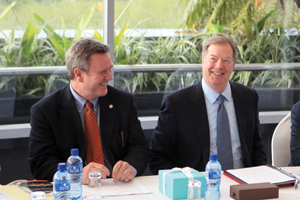 |
STRATOS SAFIOLEAS
Probst led the hiring of Scott Blackmun (left) as the USOC’s CEO, a move that won praise from an array of Olympic constituents. Blackmun served as interim CEO of the USOC in 2000. |
Like Tagliabue’s commission, the CEO search committee spoke to experts in the Olympic family. Probst even asked former USOC Chief Executive Scherr for his opinion as to what skill set the new CEO needed to have in order to succeed.
Scott Blackmun, a Colorado Springs attorney who had been the organization’s interim CEO in 2000, emerged as the committee’s consensus pick. But Blackmun didn’t agree to take the job before speaking to Probst. Blackmun knew Ueberroth, the former USOC chairman, had a reputation for being involved in the USOC’s day-to-day business. He wanted assurances that Probst wouldn’t operate the same way.
IN HIS OWN WORDS:
LARRY PROBST
■ WORST DAY ON THE JOB: The day in Copenhagen when Chicago went out in the first round.
■ MOST SATISFYING MOMENT: I don’t know if it was one particular moment, but it was the great job our team did in Vancouver in winning the overall medal count.
■ TOUGHEST NEGOTIATION: The ongoing negotiation we’re having with the IOC. Having said that, we’re making some interesting progress. Two weeks ago, we had a bit of a breakthrough. It feels like there’s a pathway to success.
■ BIGGEST DIFFERENCE BETWEEN CHAIRING A CORPORATION AND THE USOC: I would say the complexity of all the different constituencies that have to be considered in conjunction with the USOC: athletes, NGBs, the IOC, international federations, the broadcast partners. There’s a laundry list of groups you have to interact with successfully to do the job properly, whereas at a corporation you’re interacting primarily with the board and senior management.
■ PART OF THE JOB YOU ENJOY THE MOST: The travel is not always a lot of fun, but getting to see different cities around the world I wouldn’t otherwise visit and getting to meet people I wouldn’t otherwise meet.
■ PART OF THE JOB YOU ENJOY THE LEAST: The extensive travel. Sometimes it seems endless.
■ TRIP YOU MOST ENJOYED: When we took Team USA to Washington, D.C., after the Vancouver Games. Lisa Baird arranged a one-on-one meeting for me with Chief Justice Roberts in his private quarters at the Supreme Court.
■ PEOPLE YOU’VE TURNED TO MOST DOMESTICALLY FOR ADVICE AND SUPPORT: At the beginning, there was a lot of interaction with Peter Ueberroth and Pat Ryan. Obviously, Paul Tagliabue. People who have been around the movement: Anita DeFrantz, Mike Plant, Harvey Schiller, Dick Ebersol.
■ PEOPLE YOU’VE TURNED TO THE MOST INTERNATIONALLY FOR ADVICE AND SUPPORT: I’ve developed a pretty good relationship with Richard Carrión (Puerto Rico). Gerhard Heiberg (Norway). I have a pretty good relationship with Julio César Maglione (Uruguay). Thomas Bach (Germany). Dick Pound (Canada). Pat Hickey (Ireland). Gunilla Lindberg (Sweden). Lots of interaction with Mario Vazquez Rana (Mexico). Carlos Nuzman (Brazil).
— Tripp Mickle
“I have no interest or intention of being CEO of the USOC,” Probst said. “You have to be that guy. I will be there for help and support and whatever you need, but you are going to be the guy who makes the decisions and runs the organization.”
Blackmun accepted the job and was named CEO in January 2010. No one questioned his selection. It was heralded as the right move.
“We came out of the search process knowing the ship was off the rocks,” said Dave Ogrean, executive director of USA Hockey and a member of the CEO selection committee. “By the time Scott was hired, we had the sails up and the wind at our back.”
Probst and Blackmun immediately developed a strong working relationship that continues today much as it began. They still communicate daily and have weekly phone calls on Tuesday mornings that typically last half an hour. During those calls, Blackmun runs through what the USOC is working on, and Probst asks an occasional question.
“He’s not a micromanager,” Plant said. “He doesn’t meddle where the CEO has responsibility and accountability for building, planning and executing. He focuses on international and makes sure he’s a strong contributor to resolving issues there.”
The two got a major boost to the start of their relationship in Vancouver. Team USA won the medal count and broke the record for total medals won by a team during a Winter Games.
Probst behaved like a different person throughout the Olympics. In the past, he would attend the required meetings and hardly socialize, but in Vancouver, he spent almost every night at USA House, the USOC’s hospitality center, talking with NGB leaders, USOC employees and athletes.
“He started connecting with people,” Plant said. “After dinner, he’d go have a glass of wine with people and start talking about things non-Olympic.”
The Tagliabue commission delivered its findings not long after the Vancouver Games. Despite calls for Probst’s head less than six months earlier, the resulting report proposed minor changes to the USOC, not an overhaul. It recommended adding two board members, putting the CEO on the board and extending the term limit of the chairman.
“There was a lot that needed to be fixed, and [Probst] needed some time to do it,” said Michael Lynch, Visa’s head of global sponsorship.
■ ■ ■
October 2010. Probst sat at a table in the front of the dated and dimly lit ballroom at the Antlers Hilton hotel in downtown Colorado Springs, Colo. He had spent the day milling around the lobby, talking to NGB leaders and chatting with the media.
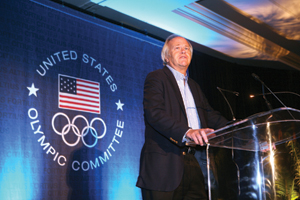 |
TOM KIMMELL
Former NBC Sports and Olympics Chairman Dick Ebersol praised Probst’s leadership during the keynote speech at the 2010 U.S. Olympic Assembly in Colorado Springs. |
Everyone he spoke to had been anticipating that night’s keynote speech from NBC’s Ebersol. The last time many had heard him speak publicly about the USOC, he had questioned its leadership on national TV.
When Ebersol took the stage, he said he had tossed his prepared speech and decided to talk about the state of the USOC. He said that after the IOC vote in Copenhagen he had called for vision, direction and leadership at the organization.
“Well, we’ve gotten that vision, we’ve certainly gotten that direction and we’ve gotten that inclusiveness in spades,” Ebersol said. “Remarkably, we’ve gotten that leadership from a man [Probst] many of us in this room wanted out of here.”
Ebersol and Probst had spent much of the past year getting to know each other and trying to move past Copenhagen. Their relationship had changed over a series of breakfasts and lunches they shared every other month in New York.
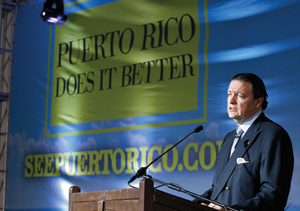 |
GETTY IMAGES
Probst made it a priority to repair ties with Puerto Rican IOC member Richard Carrión. |
Ebersol closed the speech by complimenting Probst for hiring Tagliabue and Blackmun. Then he spoke directly to the USOC chairman.
“Congratulations for the start of this incredible turnaround,” Ebersol said. “We are very lucky to have your leadership, and we hope we have it for a very long time.”
The relationship with Ebersol was one of two key relationships Probst wanted to repair. The other was with Carrión.
The Puerto Rican IOC member was still upset with Probst when they met in Vancouver for the first time. They later dined in Singapore at the Youth Olympic Games, and things seemed to be getting better. But the big breakthrough came during a vacation Probst and his wife took in Puerto Rico.
WHAT OTHERS ARE SAYING ABOUT PROBST:
■ ON WHAT IT’S LIKE TO CHAIR THE USOC:
“At most volunteer organizations, I don’t care if it’s the Metropolitan Opera or the American Cancer Society, you rely on your top executive for everything. The Olympic movement is different. It’s a charitable organization but it doesn’t act like one. It’s in the paper every day. The president has to be the leader. Once he knew it was on his shoulders, he stepped in and had the leadership qualities to do it.”
— Harvey Schiller
Former president,
Turner Sports and the USOC
■ ON WHAT PEOPLE THOUGHT OF PROBST INITIALLY:
“I started with a wait and see attitude. I certainly respected what he’d achieved in his professional life and I wasn’t quite sure how that would translate into his new responsibility.”
— Pat Ryan
Former chairman, Chicago2016 Founder, Aon Corp.
■ ON THE NATIONAL GOVERNING BODY VOTE OF NO CONFIDENCE AND SUBSEQUENT MEETING AT EA:
“We backed Larry into a corner. He either had to show he was the right person for the job, or he could say, ‘Screw you all, I’m out of here.’ To his credit, and the benefit of the Olympic movement, he hung in there.”
— Skip Gilbert
Former CEO,
USA Triathlon
■ ON SEEKING ADVICE FROM OTHERS:
“You didn’t feel like you needed to hold back at all. You could be real candid. The way he processes information is he takes it from a number of sources. He’s got a great mental capacity and the business acumen to then make the right decision for the organization.”
— Michael Lynch
Visa, head of global
partnerships
■ ON SPONSORSHIP REVENUE INCREASES:
“There’s been a lot of success with sponsorship in Larry’s tenure, and he deserves credit for that even if he hasn’t been out taking meetings himself because the reputation of the organization has been substantially improved since October 2009.”
— Max Cobb
Executive director,
US Biathlon
— Compiled by Tripp Mickle
The Probsts met Carrión and his wife for dinner one night, and the couples traded stories about how they had met and married. At the end of dinner, Carrión asked Probst how he was getting from Mayaguez to San Juan the next day.
“We’re going to drive or take a commuter flight,” Probst said.
“No, you’re not,” Carrión said. “You’re going to use my helicopter.”
The following day, Carrión’s helicopter landed in the parking lot of the Probsts’ hotel and flew them to San Juan. It was a generous gesture from a man who had called Probst on the phone in a fit of fury over the USOC network plans.
“That’s behind us,” Carrión said. “He’s a very savvy businessman, and he’s made a tremendous effort. He’s gaining the confidence of a lot of IOC members. He certainly has mine.”
■ ■ ■
July 2011. Larry Probst boarded a plane in San Francisco for a 24-hour flight to Durban, South Africa, to attend his first IOC General Assembly since Chicago lost its host bid in 2009. His calendar for the next four months was brutal: Durban for IOC meetings; Rio de Janeiro to tour 2016 Olympic venues; Lima, Peru, to meet with the Peruvian Olympic Committee; and Guadalajara, Mexico, for the Pan American Games.
“The work of the IOC gets done through personal relationships, and the only way you’re going to build those is to show up at the meetings and competitions and sessions and you name it and spend time with those people and go out to dinner with them and go out to lunches and get to know their spouses,” Probst said. “That’s what you have to do. That’s a huge part of my responsibility, and some of the places we travel to aren’t the hottest spots in the world, but you’ve got to be there.”
Probst has made a commitment to be there internationally, and when he’s there, his schedule is full with meetings and lunches and dinners. Just two weeks ago in Durban, he met Australian IOC member John Coates for lunch and signed a bilateral cooperation agreement that will see the Australian Olympic Committee and the USOC host athlete and coach exchanges and share best practices. He also met German IOC member Thomas Bach in his suite and signed a similar agreement.
“The words people say in the international community: changed man,” said Bob Fasulo, former USOC chief of international relations. “Compared to those early days when the impression was he wasn’t as interested or as interactive, now people see he’s fully engaged.”
Domestically, Probst has taken a back seat and watched Blackmun forge ahead. The CEO cut a landmark agreement with NBC to jointly sell select sponsorship categories, which allowed the USOC to pick up two new sponsors, TD Ameritrade and Citi, ahead of the 2012 Olympics. He also restructured the organization, separating sports performance from sports operation, and initiated an aggressive fundraising program by recruiting new, high-profile trustees.
Probst and Blackmun are working together to resolve the most pressing issue facing the U.S. Olympic movement — a solution to the revenue-sharing dispute with the IOC. A meeting in New York two weeks ago gave both men cause for optimism, and both believe they could be weeks away from a groundbreaking new agreement.
Almost no one anticipated he would still be in his post a year before the London Olympics, much less be the organization’s leader when those Games begin this time next year. His term as chairman is set to expire in 2012, but he will be eligible for re-election, and those who know him best don’t expect him to go anywhere any time soon.
“I don’t see him retiring,” Tagliabue said. “He’s of the view that continuity is important. It’s one of the badges of respect, and Larry’s interested in earning that badge.”









